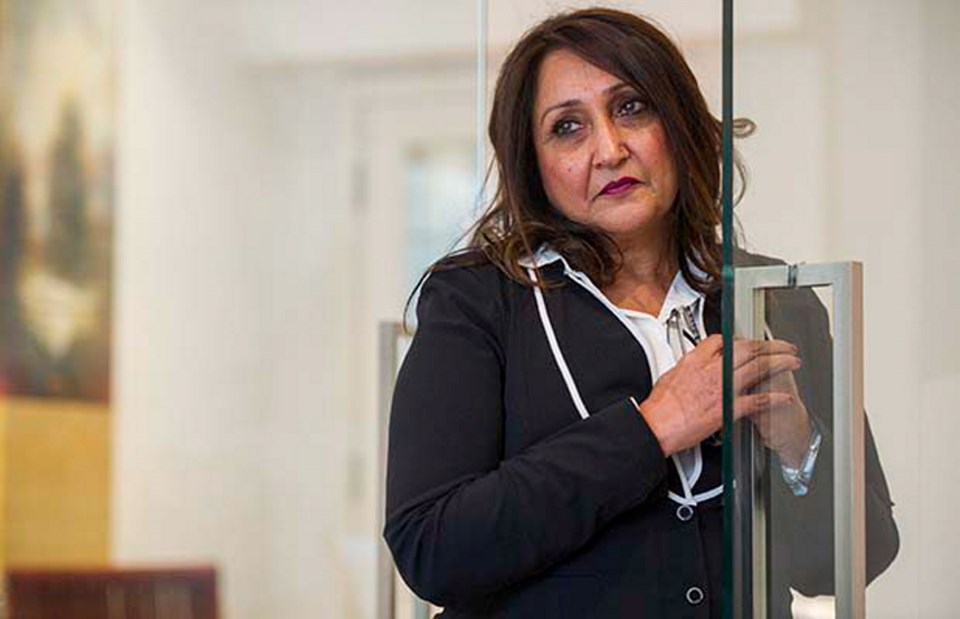A West Vancouver woman acquitted two years ago of enslaving a maid during in a high-profile trial is now suing the federal and provincial governments, alleging she lost money and her reputation due to the wrongful prosecution.
“Hell on earth — it has been very, very hard for us, the whole family. Even after I had been acquitted, it is very, very difficult to get over the facts of what has happened,” Mumtaz Ladha said in an interview with The Sun.
“I don’t see, in a long time, how we are going to get back to our normal lives.”
Ladha was charged in May 2011 with human trafficking, accused of smuggling a young Tanzanian woman into Canada, starving her and forcing her to work 18 hours a day for no pay. The story went viral around the world, as police said the woman was fed only table scraps and imprisoned without communication with the outside world.
After a 22-day trial in 2013, however, the judge discredited the testimony of the complainant and several prosecution witnesses, and accepted Ladha’s story that she had treated the young woman like a family member, not a slave.
“The allegations made by (the complainant) are improbable,” B.C. Supreme Court Justice Lauri Ann Fenlon ruled. “It appears far more likely that the complainant took advantage of Mrs. Ladha’s generosity in order to come to Canada, and then took advantage of an opportunity she saw to remain in this country, showing a callous disregard for her benefactor and the truth in the process.”
The Crown did not appeal the acquittal.
Despite the verdict, Ladha alleges in a civil suit filed today that she lost businesses, friends and her reputation during the ordeal, as she was salaciously accused of keeping a modern-day slave in her multi-million-dollar West Vancouver mansion.
Ladha’s lawyer, David Martin, said his client’s losses are in the millions of dollars and hopes she will see significant compensation. The suit lists as defendants the Attorney General of Canada, which oversees the RCMP, and the provincial government, as its Civil Forfeiture Office froze access to the equity in the family’s home.
Before the accusations surfaced, the Ladhas were successful entrepreneurs, and regularly donated generously to charities.
“The negligent investigations had devastating effects on the reputation and businesses of the (Ladhas),” the 59-page civil suit says. “The RCMP publicly accused the plaintiffs of some of the most heinous behaviour known to man: enslaving, starving and sleep-depriving a fellow human being.”
Martin alleges in the civil suit that the RCMP had “tunnel vision” with this case — that the police force wanted a rare human-trafficking conviction and were unwilling to backtrack when the evidence of the complainant and key witnesses began to unravel.
Documents filed in court today allege a litany of holes in the RCMP’s case, some of which were revealed during the criminal trial. Among them were that the complainant, whom Ladha befriended in Tanzania, was not treated as an illegal slave but entered Canada with proper documentation; attended parties, restaurants and vacations with the Ladha family; had a Canadian cellphone, which she freely used; and spent multiple weeks of her six months here alone in the Ladhas’ mansion while they were travelling for business.
The complainant, who cannot be identified due to a publication ban that was issued for the criminal trial, is not named as a defendant in the case. Martin said she is reportedly still in Canada, as she was permitted to stay here under a section of the Immigration Act that applies to victims of human trafficking.
At the time police started to investigate the case, in June 2009, the complainant’s visitor’s visa was about to expire, but a bewildered Ladha said she would have helped the young woman stay in Canada.
“I had an excellent relationship with her, she was like my own daughter,” Ladha said.
As the documents were filed today, the federal and provincial governments have not yet filed statements of defence.



